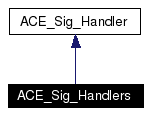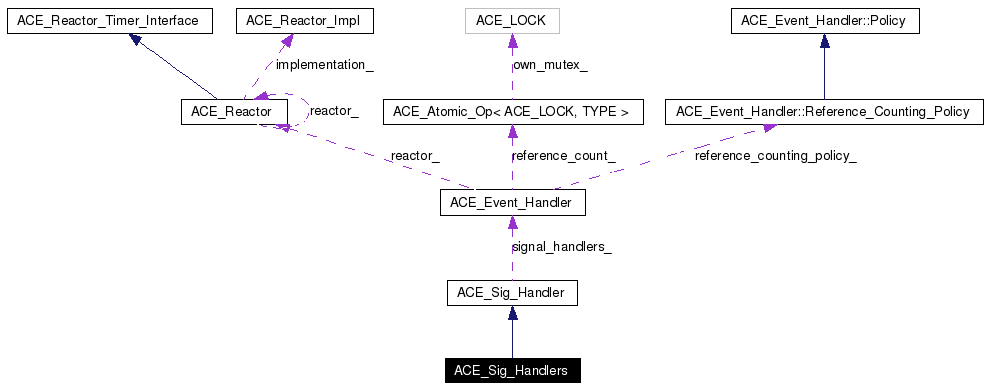
#include <Signal.h>
Inheritance diagram for ACE_Sig_Handlers:


Public Member Functions | |
| virtual int | register_handler (int signum, ACE_Event_Handler *new_sh, ACE_Sig_Action *new_disp=0, ACE_Event_Handler **old_sh=0, ACE_Sig_Action *old_disp=0) |
| virtual int | remove_handler (int signum, ACE_Sig_Action *new_disp=0, ACE_Sig_Action *old_disp=0, int sigkey=-1) |
| virtual ACE_Event_Handler * | handler (int signum) |
| virtual ACE_Event_Handler * | handler (int signum, ACE_Event_Handler *) |
| void | dump (void) const |
| Dump the state of an object. | |
Static Public Member Functions | |
| void | dispatch (int signum, siginfo_t *, ucontext_t *) |
Public Attributes | |
| ACE_ALLOC_HOOK_DECLARE | |
| Declare the dynamic allocation hooks. | |
Static Private Attributes | |
| int | sigkey_ = 0 |
| int | third_party_sig_handler_ = 0 |
Using this class a program can register one or more ACE_Event_Handler with the ACE_Sig_Handler in order to handle a designated . When a signal occurs that corresponds to this , the methods of all the registered ACE_Event_Handlers are invoked automatically.
Definition at line 440 of file Signal.h.
|
||||||||||||||||
|
Callback routine registered with sigaction(2) that dispatches the method of all the pre-registered ACE_Event_Handlers for Reimplemented from ACE_Sig_Handler. Definition at line 809 of file Signal.cpp. References ACE_ASSERT, ACE_SIG_HANDLERS_ITERATOR, ACE_SIG_HANDLERS_SET, ACE_TRACE, ACE_Fixed_Set_Iterator_Base< T, ACE_SIZE >::advance(), ACE_Sig_Handlers_Set::instance(), ACE_Fixed_Set_Iterator< T, ACE_SIZE >::next(), ACE_Fixed_Set< T, ACE_SIZE >::remove(), and ucontext_t.
00812 {
00813 ACE_TRACE ("ACE_Sig_Handlers::dispatch");
00814 // The following is #ifdef'd out because it's entirely non-portable
00815 // to acquire a mutex in a signal handler...
00816 #if 0
00817 ACE_MT (ACE_Recursive_Thread_Mutex *lock =
00818 ACE_Managed_Object<ACE_Recursive_Thread_Mutex>::get_preallocated_object
00819 (ACE_Object_Manager::ACE_SIG_HANDLER_LOCK);
00820 ACE_TSS_Guard<ACE_Recursive_Thread_Mutex> m (*lock));
00821 #endif /* 0 */
00822
00823 // Save/restore errno.
00824 ACE_Errno_Guard error (errno);
00825
00826 ACE_Sig_Handler::sig_pending_ = 1;
00827
00828 // Darn well better be in range since the OS dispatched this...
00829 ACE_ASSERT (ACE_Sig_Handler::in_range (signum));
00830
00831 ACE_SIG_HANDLERS_SET *handler_set =
00832 ACE_Sig_Handlers_Set::instance (signum);
00833
00834 ACE_SIG_HANDLERS_ITERATOR handler_iterator (*handler_set);
00835
00836 for (ACE_Event_Handler **eh = 0;
00837 handler_iterator.next (eh) != 0;
00838 handler_iterator.advance ())
00839 {
00840 if ((*eh)->handle_signal (signum, siginfo, ucontext) == -1)
00841 {
00842 handler_set->remove (*eh);
00843 delete *eh;
00844 }
00845 }
00846 }
|
|
|
Dump the state of an object.
Reimplemented from ACE_Sig_Handler. Definition at line 612 of file Signal.cpp. References ACE_TRACE.
00613 {
00614 #if defined (ACE_HAS_DUMP)
00615 ACE_TRACE ("ACE_Sig_Handlers::dump");
00616 #endif /* ACE_HAS_DUMP */
00617 }
|
|
||||||||||||
|
Set a new ACE_Event_Handler that is associated with SIGNUM at the head of the list of signals. Return the existing handler that was at the head. Reimplemented from ACE_Sig_Handler. Definition at line 871 of file Signal.cpp. References ACE_NEW_RETURN, ACE_SIG_HANDLERS_ITERATOR, ACE_SIG_HANDLERS_SET, ACE_TRACE, ACE_Fixed_Set< T, ACE_SIZE >::insert(), ACE_Sig_Handlers_Set::instance(), ACE_Fixed_Set_Iterator< T, ACE_SIZE >::next(), ACE_Fixed_Set< T, ACE_SIZE >::remove(), and sigkey_.
00872 {
00873 ACE_TRACE ("ACE_Sig_Handlers::handler");
00874 ACE_SIG_HANDLERS_SET *handler_set =
00875 ACE_Sig_Handlers_Set::instance (signum);
00876 ACE_SIG_HANDLERS_ITERATOR handler_iterator (*handler_set);
00877 ACE_Event_Handler **eh = 0;
00878
00879 // Find the first handler...
00880 handler_iterator.next (eh);
00881
00882 // ... then remove it from the set ...
00883 handler_set->remove (*eh);
00884
00885 // ... and then insert the new signal handler into the beginning of
00886 // the set (note, this is a bit too tied up in the implementation of
00887 // ACE_Unbounded_Set...).
00888 ACE_Sig_Adapter *temp;
00889
00890 ACE_NEW_RETURN (temp,
00891 ACE_Sig_Adapter (new_sh,
00892 ++ACE_Sig_Handlers::sigkey_),
00893 0);
00894 handler_set->insert (temp);
00895 return *eh;
00896 }
|
|
|
Return the head of the list of ACE_Sig_Handlers associated with SIGNUM. Reimplemented from ACE_Sig_Handler. Definition at line 853 of file Signal.cpp. References ACE_SIG_HANDLERS_ITERATOR, ACE_SIG_HANDLERS_SET, ACE_TRACE, ACE_Sig_Handlers_Set::instance(), and ACE_Fixed_Set_Iterator< T, ACE_SIZE >::next().
00854 {
00855 ACE_TRACE ("ACE_Sig_Handlers::handler");
00856 ACE_SIG_HANDLERS_SET *handler_set =
00857 ACE_Sig_Handlers_Set::instance (signum);
00858 ACE_SIG_HANDLERS_ITERATOR handler_iterator (*handler_set);
00859 ACE_Event_Handler **eh = 0;
00860 handler_iterator.next (eh);
00861 return *eh;
00862 }
|
|
||||||||||||||||||||||||
|
Add a new ACE_Event_Handler and a new sigaction associated with . Passes back the existing ACE_Event_Handler and its sigaction if pointers are non-zero. Returns -1 on failure and a that is >= 0 on success. Reimplemented from ACE_Sig_Handler. Definition at line 623 of file Signal.cpp. References ACE_BIT_DISABLED, ACE_NEW_RETURN, ace_signal_handlers_dispatcher, ACE_SignalHandler, ACE_TRACE, ACE_Sig_Action::flags(), ACE_Sig_Action::handler(), ACE_Sig_Handler::in_range(), ACE_Fixed_Set< T, ACE_SIZE >::insert(), ACE_Sig_Handlers_Set::instance(), ACE_Sig_Action::register_action(), ACE_Fixed_Set< T, ACE_SIZE >::remove(), ACE_Sig_Action::retrieve_action(), SA_RESTART, SA_SIGINFO, SIG_DFL, SIG_IGN, ACE_Sig_Adapter::sigkey(), sigkey_, and third_party_sig_handler_.
00628 {
00629 ACE_TRACE ("ACE_Sig_Handlers::register_handler");
00630 ACE_MT (ACE_Recursive_Thread_Mutex *lock =
00631 ACE_Managed_Object<ACE_Recursive_Thread_Mutex>::get_preallocated_object
00632 (ACE_Object_Manager::ACE_SIG_HANDLER_LOCK);
00633 ACE_Guard<ACE_Recursive_Thread_Mutex> m (*lock));
00634
00635 if (ACE_Sig_Handler::in_range (signum))
00636 {
00637 ACE_Sig_Adapter *ace_sig_adapter = 0; // Our signal handler.
00638 ACE_Sig_Adapter *extern_sh = 0; // An external signal handler.
00639 ACE_Sig_Action sa;
00640
00641 // Get current signal disposition.
00642 sa.retrieve_action (signum);
00643
00644 // Check whether we are already in control of the signal
00645 // handling disposition...
00646
00647 if (!(sa.handler () == ace_signal_handlers_dispatcher
00648 || sa.handler () == ACE_SignalHandler (SIG_IGN)
00649 || sa.handler () == ACE_SignalHandler (SIG_DFL)))
00650 {
00651 // Drat, a 3rd party library has already installed a signal ;-(
00652
00653 // Upto here we never disabled RESTART_MODE. Thus,
00654 // RESTART_MODE can only be changed by 3rd party libraries.
00655
00656 if (ACE_BIT_DISABLED (sa.flags (), SA_RESTART)
00657 && ACE_Sig_Handlers::third_party_sig_handler_)
00658 // Toggling is disallowed since we might break 3rd party
00659 // code.
00660 return -1;
00661
00662 // Note that we've seen a 3rd party handler...
00663 ACE_Sig_Handlers::third_party_sig_handler_ = 1;
00664
00665 // Create a new 3rd party disposition, remembering its
00666 // preferred signal blocking etc...;
00667 ACE_NEW_RETURN (extern_sh,
00668 ACE_Sig_Adapter (sa,
00669 ++ACE_Sig_Handlers::sigkey_),
00670 -1);
00671 // Add the external signal handler to the set of handlers
00672 // for this signal.
00673 if (ACE_Sig_Handlers_Set::instance (signum)->insert (extern_sh) == -1)
00674 {
00675 delete extern_sh;
00676 return -1;
00677 }
00678 }
00679 // Add our new handler at this point.
00680 ACE_NEW_RETURN (ace_sig_adapter,
00681 ACE_Sig_Adapter (new_sh,
00682 ++ACE_Sig_Handlers::sigkey_),
00683 -1);
00684 // Add the ACE signal handler to the set of handlers for this
00685 // signal (make sure it goes before the external one if there is
00686 // one of these).
00687 if (ACE_Sig_Handlers_Set::instance (signum)->insert (ace_sig_adapter) == -1)
00688 {
00689 // We couldn't reinstall our handler, so let's pretend like
00690 // none of this happened...
00691 if (extern_sh)
00692 {
00693 ACE_Sig_Handlers_Set::instance (signum)->remove (extern_sh);
00694 delete extern_sh;
00695 }
00696 delete ace_sig_adapter;
00697 return -1;
00698 }
00699 // If ACE_Sig_Handlers::dispatch() was set we're done.
00700 else if (sa.handler () == ace_signal_handlers_dispatcher)
00701 return ace_sig_adapter->sigkey ();
00702
00703 // Otherwise, we need to register our handler function so that
00704 // all signals will be dispatched through ACE.
00705 else
00706 {
00707 // Make sure that new_disp points to a valid location if the
00708 // user doesn't care...
00709 if (new_disp == 0)
00710 new_disp = &sa;
00711
00712 new_disp->handler (ace_signal_handlers_dispatcher);
00713
00714 // Default is to restart signal handlers.
00715 new_disp->flags (new_disp->flags () | SA_RESTART);
00716 new_disp->flags (new_disp->flags () | SA_SIGINFO);
00717
00718 // Finally install (possibly reinstall) the ACE signal
00719 // handler disposition with the SA_RESTART mode enabled.
00720 if (new_disp->register_action (signum, old_disp) == -1)
00721 {
00722 // Yikes, lots of roll back at this point...
00723 ACE_Sig_Handlers_Set::instance (signum)->remove (ace_sig_adapter);
00724 delete ace_sig_adapter;
00725
00726 if (extern_sh)
00727 {
00728 ACE_Sig_Handlers_Set::instance (signum)->remove (extern_sh);
00729 delete extern_sh;
00730 }
00731 return -1;
00732 }
00733 else // Return the signal key so that programs can cancel this
00734 // handler if they want!
00735 return ace_sig_adapter->sigkey ();
00736 }
00737 }
00738
00739 return -1;
00740 }
|
|
||||||||||||||||||||
|
Remove an ACE_Event_Handler currently associated with . We remove the handler if (1) its matches the passed as a parameter or (2) if we've been told to remove all the handlers, i.e., == -1. If a new disposition is given it is installed and the previous disposition is returned (if desired by the caller). Returns 0 on success and -1 if is invalid. Reimplemented from ACE_Sig_Handler. Definition at line 748 of file Signal.cpp. References ACE_SIG_HANDLERS_ITERATOR, ACE_SIG_HANDLERS_SET, ACE_TRACE, ACE_Fixed_Set_Iterator_Base< T, ACE_SIZE >::advance(), ACE_Sig_Handler::in_range(), ACE_Sig_Handlers_Set::instance(), ACE_Fixed_Set_Iterator< T, ACE_SIZE >::next(), ACE_Sig_Action::register_action(), ACE_Fixed_Set< T, ACE_SIZE >::remove(), SIG_DFL, ACE_Sig_Adapter::sigkey(), and ACE_Fixed_Set< T, ACE_SIZE >::size().
00752 {
00753 ACE_TRACE ("ACE_Sig_Handlers::remove_handler");
00754 ACE_MT (ACE_Recursive_Thread_Mutex *lock =
00755 ACE_Managed_Object<ACE_Recursive_Thread_Mutex>::get_preallocated_object
00756 (ACE_Object_Manager::ACE_SIG_HANDLER_LOCK);
00757 ACE_Guard<ACE_Recursive_Thread_Mutex> m (*lock));
00758
00759 if (ACE_Sig_Handler::in_range (signum))
00760 {
00761 ACE_SIG_HANDLERS_SET *handler_set =
00762 ACE_Sig_Handlers_Set::instance (signum);
00763
00764 ACE_SIG_HANDLERS_ITERATOR handler_iterator (*handler_set);
00765
00766 // Iterate through the set of handlers for this signal.
00767
00768 for (ACE_Event_Handler **eh;
00769 handler_iterator.next (eh) != 0;
00770 handler_iterator.advance ())
00771 {
00772 // Type-safe downcast would be nice here...
00773 ACE_Sig_Adapter *sh = (ACE_Sig_Adapter *) *eh;
00774
00775 // Remove the handler if (1) its key matches the key we've
00776 // been told to remove or (2) if we've been told to remove
00777 // *all* handlers (i.e., <sigkey> == -1).
00778
00779 if (sh->sigkey () == sigkey || sigkey == -1)
00780 {
00781 handler_set->remove (*eh);
00782 delete *eh;
00783 }
00784 }
00785
00786 if (handler_set->size () == 0)
00787 {
00788 // If there are no more handlers left for a signal then
00789 // register the new disposition or restore the default
00790 // disposition.
00791
00792 ACE_Sig_Action sa (SIG_DFL, (sigset_t *) 0);
00793
00794 if (new_disp == 0)
00795 new_disp = &sa;
00796
00797 return new_disp->register_action (signum, old_disp);
00798 }
00799 return 0;
00800 }
00801 else
00802 return -1;
00803 }
|
|
|
Declare the dynamic allocation hooks.
Reimplemented from ACE_Sig_Handler. |
|
|
Keeps track of the id that uniquely identifies each registered signal handler. This id can be used to cancel a timer via the method. Definition at line 574 of file Signal.cpp. Referenced by handler(), and register_handler(). |
|
|
If this is > 0 then a 3rd party library has registered a handler... Definition at line 578 of file Signal.cpp. Referenced by register_handler(). |
 1.3.6
1.3.6